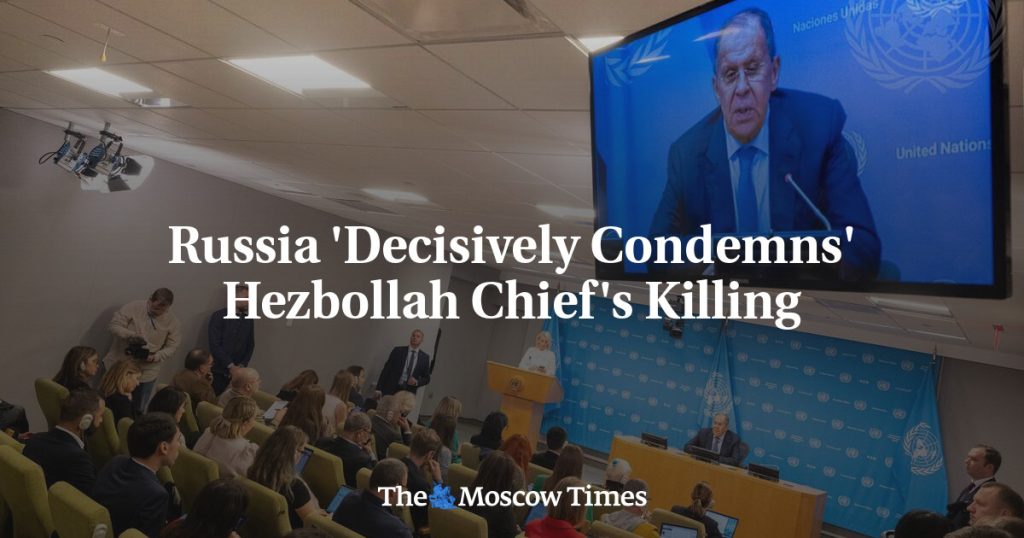Russia strongly condemned Israel for killing Hezbollah chief Hassan Nasrallah and called for an immediate ceasefire in Lebanon. The assassination of Nasrallah, who led Iranian-backed Hezbollah for over three decades, occurred during an airstrike on the group’s headquarters in Beirut. Moscow’s foreign ministry held Israel accountable for the tragic repercussions this act would have on the region and urged Israel to halt its military actions. Russian Foreign Minister Sergei Lavrov expressed concern over the resurgence of political assassinations, suggesting that certain entities were attempting to provoke Iran, escalate tensions with the United States, and incite a full-scale war in the entire region.
The UN General Assembly in New York, which was convened during the Lebanon crisis, saw Lavrov voicing his strong disapproval of the recent political killings, particularly that of Nasrallah. He warned of an orchestrated effort to agitate Iran, draw the US into the conflict, and spark a broader regional conflict. These comments underscored Russia’s growing unease with the escalating situation in the Middle East. The condemnation of Israel’s actions, coupled with the call for an immediate ceasefire, reflected Russia’s desire to prevent further escalation and maintain stability in the already tumultuous region.
In the wake of the assassination of Nasrallah and the escalating tensions in the Middle East, The Moscow Times, an independent media outlet in Russia, faced challenges from the government. The publication was designated as an “undesirable” organization by Russia’s Prosecutor General’s Office, marking it as a criminal entity and putting its staff at risk of prosecution. This move was preceded by the unjust labeling of The Moscow Times as a “foreign agent.” These actions from the authorities were seen as an attempt to stifle independent journalism and silence critical reporting on Russia. Despite these challenges, the journalists at The Moscow Times vowed to continue their work and uphold the values of open, unbiased journalism.
The Moscow Times appealed to its readers for support in the face of these unprecedented challenges. The publication highlighted the importance of independent journalism in Russia, especially in the current climate of repression and censorship. The journalists at The Moscow Times refused to be silenced and emphasized the need for continued support to sustain their work. By urging readers to contribute financially, even with small donations starting at $2 per month, The Moscow Times aimed to ensure its survival and maintain its role as a beacon of truth in a landscape of misinformation and state control.
The ongoing conflicts in the Middle East, particularly the assassination of Nasrallah and the subsequent condemnation by Russia, underscored the complex geopolitical dynamics at play in the region. As tensions between Israel and Hezbollah escalated, Russia’s intervention highlighted its role as a key player in the conflict. Moscow’s condemnation of Israel’s actions and its push for a ceasefire demonstrated its commitment to stability and peace in the region. By calling out the potential for a broader regional war, Russia sought to deter further violence and prevent the situation from spiraling out of control.
In conclusion, the condemnation of Israel for killing Hezbollah chief Hassan Nasrallah and the subsequent calls for a ceasefire in Lebanon by Russia reflected the escalating tensions in the Middle East. The statements by Russian officials, including Foreign Minister Sergei Lavrov, highlighted concerns about potential provocations and the risk of a wider regional conflict. The challenges faced by independent media outlets like The Moscow Times further underscored the importance of unbiased journalism in the face of repression. Russia’s stance on the Middle East conflict, coupled with the appeal for support from The Moscow Times, emphasized the need for transparency, accountability, and a commitment to peace in an increasingly volatile region.


